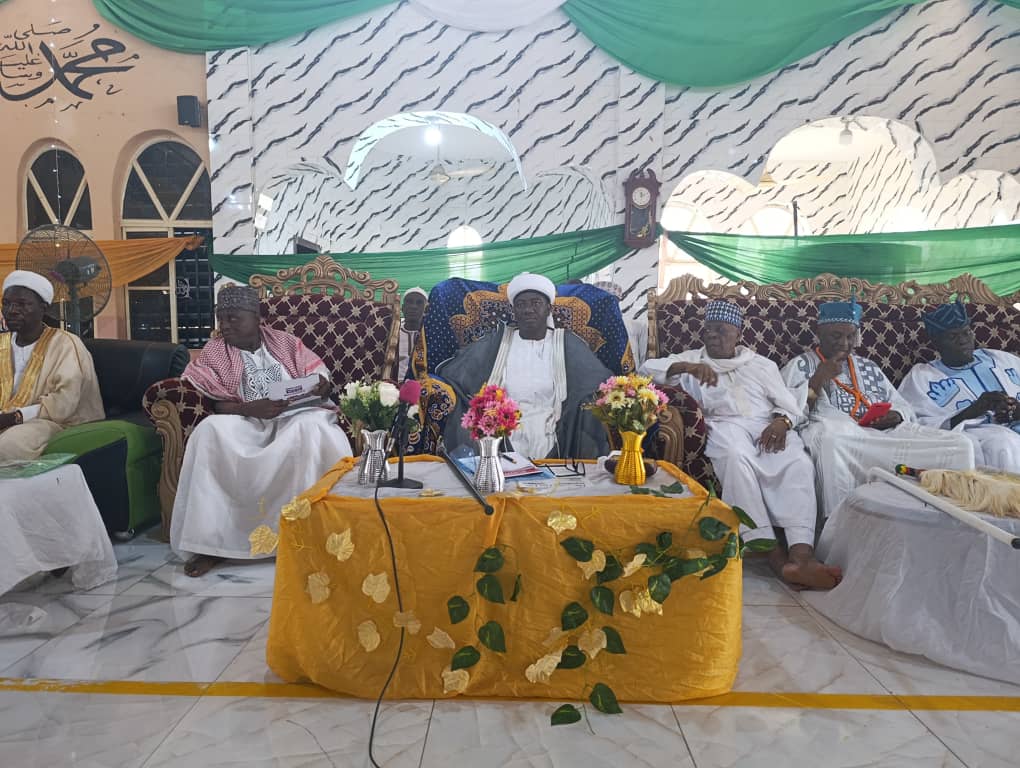Islamic Scholar Advocates for Unified Friday Sermons to Strengthen Muslim Unity

Renowned Islamic scholar Ustadh Dhikrullahi Shafii has called for the adoption of a centralised Friday sermon (Khutbah) across major mosques in Nigeria to promote unity, consistency, and collective guidance among Muslims.
He made the appeal during the 2nd Annual Imam's Conference organised by Daarus-Sa'aadah Islamic Centre in Ajase-Ipo, Kwara State. Themed "The Mosque, the Imam and Da'wah", the event brought together Islamic scholars, imams, traditional rulers, and worshippers from across the country.
In his keynote lecture titled "The Role of the Mosque in Building the Ideal Muslim," Ustadh Shafii emphasized that the mosque (Masjid) is far more than a place of prayer. Historically, he noted, it served as a hub for community decision-making, social welfare, refuge, and even medical care.
"The three core elements in this theme mosque, imam, and da'wah have been largely neglected in our time, and this has contributed to disunity and moral decline within the Ummah," he said.
By adopting a unified sermon, Shafii believes Muslims can receive consistent religious and societal guidance on pressing national issues from insecurity and corruption to education and youth development.
His proposal has sparked growing discussion among clerics and Islamic organisations about standardising religious messaging without compromising local relevance.
He described the Imam as the principal of the mosque whose role goes beyond delivering stories.
"Rather, it requires deep grounding in Qur'an, Hadith, Fiqh and global issues", Shafii who is the Grand Mufti of the Organization of Islamic Conference (OIC), said.
He emphasised that no single individual could master all branches of Islamic jurisprudence and advised Imams and scholars to specialise in particular fields while working together for the benefit of the community.
The mosque, he noted, must be repositioned to serve the Ummah fully, including the creation of committees to address the needs of children, women, the aged, marriage, naming ceremonies and conflict resolution.
He stressed that when properly utilised, mosques could once again produce pious leaders and scholars as they did in the early history of Islam.
Shafii further recommended that the conference should be extended to two or three days in order to deepen its impact, with a communiqué issued and adopted by mosques across the state for implementation.
In his paper on "Da'wah without Bitterness: Etiquette of Disagreement in Islam," Dr. Sirajudeen Bila Al-Asra urged scholars and preachers to adopt humility, patience and wisdom in propagating Islam and resolving disputes.
He cautioned against arrogance in preaching and reminded participants that Islam abhors bitterness in da'wah, adding that the strength of the message lies in its truth and delivery, not in hostility.
Founder and sponsor of the conference, Alhaja Rahmat Mojisola Salih, a Lagos-based businesswoman, said her motivation for the annual event was inspired by her grandmother who instilled in her the habit of dedicating part of her earnings to the service of the mosque.
She recalled her early days hawking bread and other items in the town as a primary school pupil and narrated how her grandmother taught her to buy brooms and soap for cleaning the mosque.
She explained that the annual Imam Conference was her way of sustaining that tradition of service and philanthropy, urging others to emulate the gesture to promote a safer and more dedicated society.
The Chief Imam of Ajase-Ipo, Shaykh Aliyu Taofeeq Atoloye, who chaired the occasion, said the programme has continued to have great impact on Islamic scholars and imams who used the gathering to exchange ideas and strengthen their knowledge.
He said this year's theme opened a deeper understanding of the role of the mosque beyond worship, stressing that the institution must remain central to the moral and spiritual life of the Ummah.
In his goodwill message, the Olupo of Ajase-Ipo, Oba Ismail Muhammed Yahya Atoloye, described the programme as a blessed exercise and recommended its extension to three days because of the immense benefits embedded in it.
He called for the sustainability of the initiative and urged that more people should key into it to strengthen the religious and social life of the community.
Governor AbdulRahman AbdulRazaq, in his goodwill message, described the event as highly educative.
He appreciated the organisers for championing a noble cause aimed at equipping Imams and scholars with deeper religious knowledge for the advancement of Islam.
Cloud Tag: What's trending
Click on a word/phrase to read more about it.
Samuel Adedoyin Curfew Kwara Basketball Association Abdulraheem Yusuf Okin Malt Abdullahi Imam Abdullahi Femi Ogunsola National Pilot UITH Abdulrosheed Okiki Tafida Of Kaiama Mahmud Babatunde Baker Peter Obi Kunle Okeowo Adesoye College Afusat Nike Ibrahim Albert Ogunsola Yusuf Mubarak Olaoye B. Felix Elerinjare-Ibobo Kwabes Kwara State Football Association Abdulrazaq Adebayo Salake Abdulrahman Iliasu Olugbense Olota Of Odo-Owa Isaac Aderemi Kolawole Saduki Lafiagi Gbajabiamila Gbenga Awoyale A.E. Afolabi Olusegun Adeniyi Eruku TESCOM 2025 Ojo Fadumila Ajakaye Buari Edun Ahmad Olanrewaju Belgore Aisha Ahman-Pategi Abdullahi Atanda Abdulrazaq Sanni Umar Saro Taofeek Sanusi V.O. Abioye Sunset Workers Kwara Teaching Service Commission Oko-Olowo Kisra Yakubu Gobir Monsurat Omotosho Tuesday Assayomo Ishaq Oloyede Awoye Isiaka Rafiu Mope Saka Saadu Mumini Ishola Hanafi Jide Oyinloye Kwha.gov.ng Senate President Iliasu Fatai Garuba Labaka Yusuf Amuda Abubakar Abdulbaqi Jimoh Moremi High School Alfa Modibo Belgore Jimoh Akani Kulende-UITH TIC Manzuma Haashim Initiative For Community Advancement Ilorin East/South Federal Constituency Idiagbon Communication Network Support Services Odolaye Aremu Nigerian Medical Association Solomon Edoja


